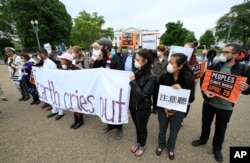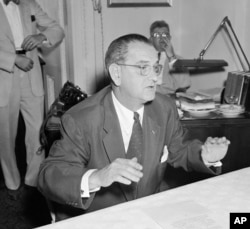President Donald Trump's executive order on Thursday making it easier for churches to dabble in politics kept faith with his promise to evangelical Christians who helped him win the White House, but could end up benefiting his opponents as well.
Leaders of the U.S. religious left, a rising force of opposition to Trump's hard-line stance on immigration and health care, said they were poised to benefit from the move, which lifts the risk of religious groups losing their tax-exempt status if they advocate for particular candidates.
"This is going to backfire on Trump," said the Reverend Jennifer Butler, chief executive of progressive policy group Faith in Public Life. "We are morally outraged at what is going on and we are appalled at the weaponization of religion."
The group is planning to mobilize voters who view some of Trump's policies as immoral. While the group does not endorse candidates, those voters in the 2018 midterm elections would back candidates who oppose those policies. Trump's order gives religious groups more liberty to do so without jeopardizing tax-exempt status.
"We're going to be mobilizing millions of voters to turn out at the polls and vote their values," Butler said.
More opposition seen
Sojourners, a Washington-based progressive Christian network that advocates for immigrants and the poor, also believes more of its members will feel free to speak out against Trump's policies, following the Thursday signing.
"I wouldn't tell people whom to vote for but I would tell them what to vote against, and this might encourage more churches to speak out against him," said Jim Wallis, the group's founder. "Donald Trump's use of racism and racial bigotry is un-Christian. His attack on refugees is anti-Christian."
Trump has repeatedly and angrily denied allegations that his policies are racist, emphasizing that limits on immigration are essential for national security. The Republican president cited historically black churches and slain civil rights leader Martin Luther King Jr. as important drivers of U.S. social progress before signing the order.
'Sword of Damocles'
Evangelical and Roman Catholic leaders as well as a prominent U.S. rabbi joined Trump when he signed the order instructing the Internal Revenue Service to "alleviate the burden of the Johnson Amendment," the 1954 law prohibiting organizations that have tax-free status, including churches, from participating in political campaigns or supporting any particular candidate.
The move by Trump, who appealed to religious conservatives in his 2016 presidential run, was widely praised by religious organizations that either felt hemmed in by the law or openly violated it.
"We will not allow people of faith to be targeted, bullied or silenced anymore," Trump, who criticized the Johnson Amendment during his campaign, said at the ceremony. Rescinding the law would require an act of Congress.
Ralph Reed, a longtime leader of the religious right and chairman of the Faith & Freedom Coalition, praised the move, saying in a statement that Trump's executive order removed a "sword of Damocles that has hung over the faith community for decades."
Several prominent leaders of the religious left said it violated the U.S. separation of church and state. They noted that neither Republican nor Democratic policy stances lined up neatly with any major religion's teaching and said the move could fracture congregations by encouraging their leaders to take sides.
Lawsuit pledged
The American Civil Liberties Union promised to sue to stop it.
"Once faith leaders become partisan, it hijacks their moral authority and their impartiality in this hyperpartisan environment," said Rabbi Jonah Pesner, director of the Religious Action Center of Reform Judaism.
Ibrahim Hooper, spokesman for the Council on American-Islamic Relations, said that his group would keep urging U.S. imams to speak out on moral issues with political consequences, but would urge them to remain nonpartisan.
He wondered whether all religious leaders would follow that guidance.
"These kinds of moves, particularly by this administration, have a vast ocean of unintended consequences," he said.







